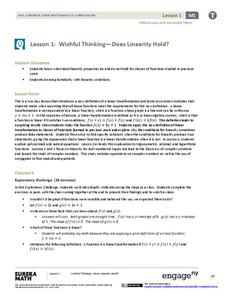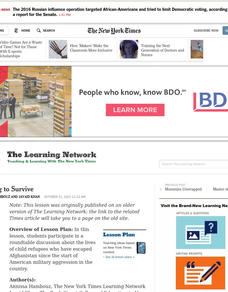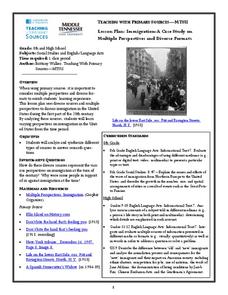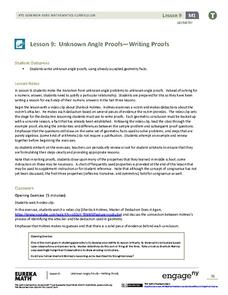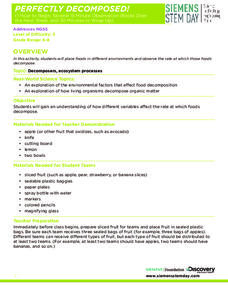Curated OER
Cite Your Sites!
The New York Times article “Lessons in Internet Plagiarism,” launches a look at how the Internet has increased the prevalence of plagiarism. The richly detailed lesson includes warm-up and wrap-up activities, discussion questions,...
EngageNY
Wishful Thinking—Does Linearity Hold? (Part 1)
Not all linear functions are linear transformations — show your class the difference. The first lesson in a unit on linear transformations and complex numbers that spans 32 segments introduces the concept of linear transformations and...
Curated OER
Learning to Survive
Using the article "Escaping Afghanistan: Children Pay Price," discuss the lives of Afghan refugees and the impact of Taliban rule. A detailed list of questions is provided, but you will have to search for the article. Extension...
Curated OER
Boogie Woogie with a B: Using Alliteration while Exploring Patriotic Tunes
Are you looking for a way to bring writing into your history instructional activity - or history into your writing instructional activity? This cross-curricular activity is helpful and fun, no matter what class you're teaching! Using...
Curated OER
Introduce: Comparison and Contrast
Class discussions can really make concepts come to life. The class discusses the differences between compare and contrast, read a book, then talk about ways they can compare events or characters in the story. Good leading question are...
EduGAINs
Data Management
Using a carousel activity, class members gain an understanding of the idea of inferences by using pictures then connecting them to mathematics. Groups discuss their individual problems prior to sharing them with the entire class. The...
EngageNY
Informal Proofs of Properties of Dilations
Challenge the class to prove that the dilation properties always hold. The instructional activity develops an informal proof of the properties of dilations through a discussion. Two of the proofs are verified with each class member...
EngageNY
Properties of Dilations
Investigate dilations to learn more about them. The second segment in a series of 16 provides a discussion of properties of dilations by going through examples. The problem set provides opportunities for scholars to construct dilations.
Middle Tennessee State University
Lesson Plan: Immigration: A Case Study on Multiple Perspectives and Diverse Formats
As part of a case study of U.S. immigration during the first part of the 20th century, class members examine a variety of primary sources that present multiple perspectives of the responses of those in favor of immigration and those...
Learning for Justice
Beauty is Skin Deep
If you are in need of a lesson on tolerance or the impact of media, this plan could be useful. The class begins with a brainstorming session in which they reflect on their own experiences with bias based on appearance. Next, they...
EngageNY
When Can We Reverse a Transformation? 1
Wait, let's start over — teach your class how to return to the beginning. The first instructional activity looking at inverse matrices introduces the concept of being able to undo a matrix transformation. Learners work with matrices with...
Curated OER
Sound Busters
Fourth graders engage in a study of sound pollution at their school. After a class discussion on what noise pollution is, learners are asked if they think there are areas of their school or community where noise pollution is a problem....
EngageNY
Unknown Angle Proofs—Writing Proofs
What do Sherlock Holmes and geometry have in common? Why, it is a matter of deductive reasoning as the class learns how to justify each step of a problem. Pupils then present a known fact to ensure that their decision is correct.
EngageNY
Analyzing a Data Set
Through discussions and journaling, classmates determine methods to associate types of functions with data presented in a table. Small groups then work with examples and exercises to refine their methods and find functions that work to...
Fluence Learning
Writing an Opinion: Student Council
A three-part assessment challenges scholars to write opinion essays covering the topic of the student council. After reading three passages, writers complete a chart, work with peers to complete a mini-research project, answer...
American Chemical Society
Hosting a Chemistry Debate
A debate is a forum for discussing controversial topics and environmental chemistry definitely fits that category. The instructional activity provides everything necessary to run a mini debate tournament. Use the suggested topics or come...
Discovery Education
Perfectly Decomposed!
We all know someone who won't eat the banana with a brown spot, the grape with a dimple, and the apple with a bruise. Scholars use different fruits to explore what happens when fruits really start to decompose. They set up an experiment...
Curated OER
Anti-Semitism Workshop
Originating from the Yad Vashem Holocaust Memorial Museum in Jerusalem, here is a resource to support your world historians in their study of World War II, the Holocaust, your cultural scholars learning about anti-semitism, or your...
Curated OER
Make a Farm
After a class discussion about where their food comes from learners construct a farm from a print-out (embedded in the plan). They work in groups, and trace a food source from the beginning. For example, they discover how a farmer grows...
Curated OER
Analyzing Two or More Nonfiction Texts
How does recognizing the author's purpose help you draw conclusions about a topic? Using two articles (both are attached), learners brainstorm why each author wrote each article. Are their purposes similar or different? Learners use a...
The New York Times
Should Anthony Weiner Resign?
The news regarding congressional representative Anthony D. Weiner's scandalous online communications was a hot-button topic in public media in 2011. Use this article to review the timeline of events surrounding the situation, and then...
EngageNY
Proof of the Pythagorean Theorem
What does similarity have to do with the Pythagorean Theorem? The activity steps through the proof of the Pythagorean Theorem by using similar triangles. Next, the teacher leads a discussion of the proof and follows it by an animated...
Bully Free Systems
Bully Free Lesson Plans—Sixth Grade
Two lessons stress the importance of keeping your classroom bully-free. Discussion, collaborative work, role-play, and writing allows participants to examine whether their classroom is welcoming to new members and decide what they should...
Council for the Curriculum, Examinations and Assessment
Managing Influences and Making Decisions
Does patience help people become more responsible? Class members explore the topic with a What's It To Do With Me? quiz to assess their personal responsibilities. They engage in a whole-class discussion about pros and cons of instant...



